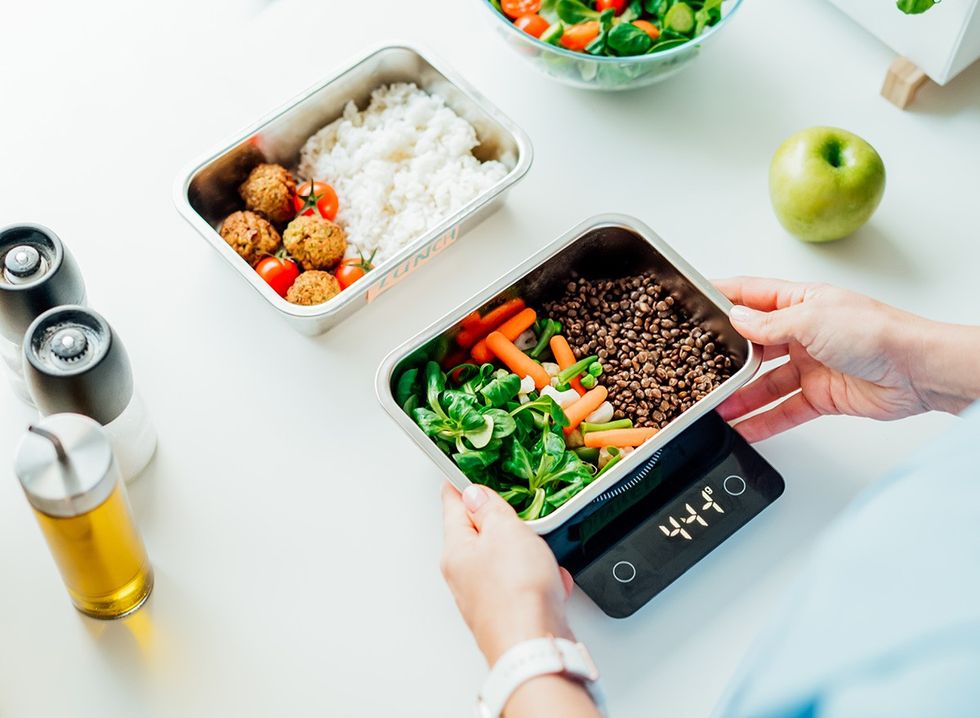Is your emotional eating out of control? “Emotional eating can sabotage your weight-loss efforts,” says the Mayo Clinic. “It often leads to eating too much — especially too much of high-calorie, sweet, and fatty foods. The good news is that if you're prone to emotional eating, you can take steps to regain control of your eating habits and get back on track with your weight-loss goals.” Here are some ways to help stop emotional eating and what happens to your body when you do.
Emotional Eating and Your Health

Emotional eating can really take a toll on your health. "One of the issues with emotional eating is that it affects, of course, how you feel physically. Overeating can reduce your energy level, cause headaches, and generally come with some discomfort," dietitian Kasey Kilpatrick tells Houston Methodist. "The other issue is that as far as resolving uncomfortable emotions goes, eating doesn't actually work."
Don’t Ignore It

There are ways to deal with emotions that have nothing to do with food. "In terms of trying to deal with emotions, there's actually a lot worse ways to cope than eating," Kilpatrick says. "However, that doesn't make emotional eating productive — or healthy, for that matter — so it's important to address it."
Emotional Vs. Regular Hunger

Emotional food cravings do not feel the same as regular hunger. “Physical hunger develops over time, first with tummy rumblings, then grumbles, then hunger pangs,” Lindsey King, PsyD, tells Peace Health. But even if you are very physically hungry, you usually can wait for food. In contrast, emotional hunger can come on suddenly, like lightning. It demands food immediately and may not stop even when a person is stuffed.”
Validate Your Emotions

Don’t suppress the emotions that lead you to eat—one of the best ways to prevent emotional eating is to give your emotions a voice. “If you validate your emotions instead of suppressing them, these feelings may stop needing your attention,” King says. “See if things change once you’ve heard them out.”
RELATED: This Plan Is How to Lose 5 Percent Body Fat In 2 Weeks
No Judgment

Don’t let shame or guilt overwhelm you. "Judgement isn't serving us here. In fact, it makes things worse," Kilpatrick explains. "Self-judgment is accompanied by shame and guilt, strong emotions that further add on to your load and make it even harder to properly process what you're feeling."
Pay Attention to Patterns

“Once you recognize a pattern, develop a strategy to break it,” says Harvard Health. “For instance, if you often eat because you think you deserve it after a tough day, remember that you also deserve to lose weight, feel healthy, and be proud of yourself.”
Manage Stress

Managing stress is very important for dealing with emotional eating. “If you eat because of stress, learn to dial back that stress,” advises Harvard Health. “Yoga, meditation, and regular exercise can help reduce stress levels.”
RELATED: 12-3-30 Walking Method: 20 Proven Tips to Lose Weight Faster
Coping Mechanisms

Experts recommend replacing eating with a different behavior/coping mechanism in your own time. "Accepting and addressing uncomfortable emotions is hard,” Kilpatrick says. “If you're feeling overwhelmed and need to save Step 2 for later, that's okay! But, ultimately, the goal is to identify a more productive way to handle what you're feeling.”
Healthy Snacks

Keep healthy snacks such as cherries on hand to prevent binging on unhealthy foods. “The key is stocking up on foods that help with your stress or emotions and avoiding processed junk that might make you feel worse,” Anna Kippen, MS, RDN, LD, tells the Cleveland Clinic.
What Happens Now?

So, what happens when you stop emotional eating? Overeating can put you at risk of many health conditions, so once you stop, you may see positive changes. "Over the course of weeks to months to years, overeating can affect your cholesterol and could potentially impact your blood sugar management, which can put you at risk for developing type 2 diabetes and heart disease," wellness dietitian Kylie Arrindell tells Houston Methodist.
Weight Loss

Once you stop eating emotionally, you may find the excess pounds suddenly falling off, especially if you replace eating with exercise. “Emotional eating can lead to overeating because it isn’t filling a need for nutrients or calories,” says Family Doctor. “Your body doesn’t need the food.”
RELATED: 15 Quick Ways to Lose Body Fat Percentage in a Week
Mental State

You may notice a positive change in your mental state once emotional eating is under control. “Overeating can also cause you to feel guilty or embarrassed,” says Family Doctor. “Emotional eating may make you feel better for a short period of time. But it doesn’t solve your problems.”
Healthier Diet

Stopping emotional eating may lead to a much healthier, nutritious diet. “Cortisol makes us crave sugary, fatty or salty foods,” psychologist Susan Albers, PsyD, tells the Cleveland Clinic. “Back in ancient times during times of stress, you needed all the calories you could get because you were involved in fight-or-flight situations. When you’re feeling stressed, you’re dealing with your ancient biology telling you, ‘Go get some food.’”
Relationship with Food

Emotional eating can lead to a dysfunctional relationship with food. Once you stop, you may learn to listen to internal cues again. “The sensation that a lot of my clients talk about is wanting that food to make them feel better or satisfied. No matter how much they eat, it never really brings them to that feeling until they feel sick or overly full, and then they stop eating,” says Dr. Albers. “But they’re hoping that as they’re eating, it’s going to change their sensation in some way.”
RELATED: I Lost 130 Pounds on the Keto Diet, and This Is How
Talk to a Professional

It’s unlikely emotional eating happens in a vacuum with no other related factors. Talk to a professional therapist or doctor about issues such as depression to help you figure out what’s triggering your emotional eating. They can help you come up with long-term solutions!
💪🔥Body Booster: When you stop emotional eating, you may experience positive changes in your cholesterol levels and blood sugar management, reducing your risk of developing type 2 diabetes and heart disease over time.














 Shutterstock
Shutterstock Shutterstock
Shutterstock Shutterstock
Shutterstock Shutterstock
Shutterstock Shutterstock
Shutterstock Shutterstock
Shutterstock Shutterstock
Shutterstock Shutterstock
Shutterstock Shutterstock
Shutterstock Shutterstock
Shutterstock

 Shutterstock
Shutterstock Shutterstock
Shutterstock Shutterstock
Shutterstock Shutterstock
Shutterstock Shutterstock
Shutterstock Shutterstock
Shutterstock Shutterstock
Shutterstock Shutterstock
Shutterstock Shutterstock
Shutterstock Shutterstock
Shutterstock Shutterstock
Shutterstock
 Shutterstock
Shutterstock Shutterstock
Shutterstock Shutterstock
Shutterstock Shutterstock/Shift Drive
Shutterstock/Shift Drive Shutterstock
Shutterstock Shutterstock
Shutterstock Shutterstock
Shutterstock Shutterstock
Shutterstock Shutterstock
Shutterstock Shutterstock
Shutterstock Shutterstock/Stokkete
Shutterstock/Stokkete
 Shutterstock
Shutterstock Shutterstock
Shutterstock Shutterstock
Shutterstock Shutterstock
Shutterstock Shutterstock
Shutterstock Shutterstock
Shutterstock Shutterstock
Shutterstock Shutterstock
Shutterstock Shutterstock
Shutterstock

 I'm a Nutritionist and These 9 High-Protein Snacks Keep My Clients Full While Losing 50 Pounds
I'm a Nutritionist and These 9 High-Protein Snacks Keep My Clients Full While Losing 50 Pounds
 Shutterstock
Shutterstock 2. Processed FoodsShutterstock
2. Processed FoodsShutterstock Shutterstock
Shutterstock Shutterstock/Prostock-studio
Shutterstock/Prostock-studio Shutterstock
Shutterstock Pro TipsShutterstock
Pro TipsShutterstock Shutterstock
Shutterstock Shutterstock
Shutterstock Shutterstock
Shutterstock Shutterstock
Shutterstock Don’t Drink as Much AlcoholShutterstock
Don’t Drink as Much AlcoholShutterstock Most Women on GLP-1s Are Making a Few Common MistakesShutterstock
Most Women on GLP-1s Are Making a Few Common MistakesShutterstock Soda and Sugary DrinksShutterstock
Soda and Sugary DrinksShutterstock Shutterstock
Shutterstock Eat BreakfastShutterstock
Eat BreakfastShutterstock And Improve Insulin SensitivityShutterstock
And Improve Insulin SensitivityShutterstock Belly Flab Strip Tip: Sugar and Fat Calories Leave Its Mark on Your BodyShutterstock
Belly Flab Strip Tip: Sugar and Fat Calories Leave Its Mark on Your BodyShutterstock Shutterstock
Shutterstock The Drugs Mimic the GLP-1 Hormone Naturally Produced by the BodyShutterstock
The Drugs Mimic the GLP-1 Hormone Naturally Produced by the BodyShutterstock 3. Deep-Fried ItemsShutterstock
3. Deep-Fried ItemsShutterstock